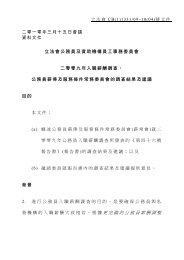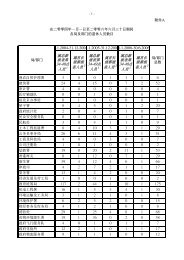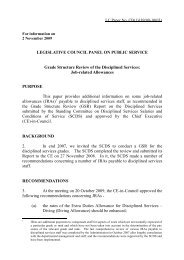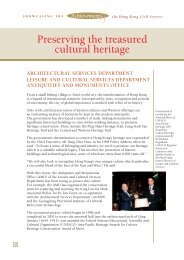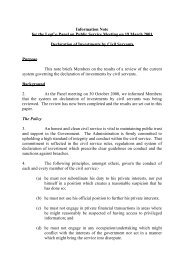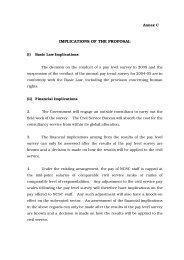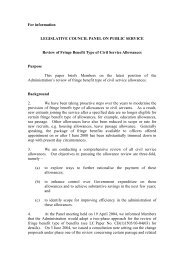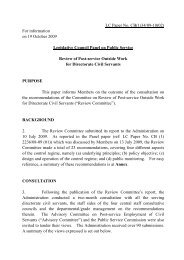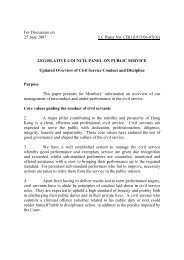LC Paper No. CB(1)1832/01-02(02) LegCo Panel on Public Service ...
LC Paper No. CB(1)1832/01-02(02) LegCo Panel on Public Service ...
LC Paper No. CB(1)1832/01-02(02) LegCo Panel on Public Service ...
You also want an ePaper? Increase the reach of your titles
YUMPU automatically turns print PDFs into web optimized ePapers that Google loves.
4. While at comm<strong>on</strong> law an employer could terminate employees’<br />
c<strong>on</strong>tracts by notice and offer them re-employment <strong>on</strong> a lower salary, the<br />
majority of civil servants have permanent c<strong>on</strong>tracts that cannot be terminated<br />
by notice and under which, subject to good c<strong>on</strong>duct, they are entitled to<br />
remain in office until they reach the retirement age prescribed by the Pensi<strong>on</strong>s<br />
Ordinances.<br />
5. While it might be possible for the Administrati<strong>on</strong> to reach such<br />
agreement with Civil <strong>Service</strong> Central C<strong>on</strong>sultative Councils <strong>on</strong> a civil service<br />
pay reducti<strong>on</strong>, such an agreement would not prevent individual civil servants<br />
from challenging any agreed pay reducti<strong>on</strong>. In the circumstances, the <strong>on</strong>ly<br />
safe way to achieve a lawful reducti<strong>on</strong> in civil service pay is through<br />
legislati<strong>on</strong>.<br />
6. For details <strong>on</strong> the need for legislati<strong>on</strong> to implement a civil service<br />
reducti<strong>on</strong>, please refer to the article prepared by Law Officer (Civil Law) at<br />
Annex A. The article, which also addresses the questi<strong>on</strong> of c<strong>on</strong>sistency of the<br />
proposed legislative approach with the Basic Law, was published in a number<br />
of newspapers <strong>on</strong> 24 May 20<str<strong>on</strong>g>02</str<strong>on</strong>g>.<br />
Item 2. Memorandum <strong>on</strong> C<strong>on</strong>diti<strong>on</strong>s of <strong>Service</strong> (MOCS)<br />
(a) Please provide various versi<strong>on</strong>s of MOCS applicable to civil<br />
servants and highlight the differences in their provisi<strong>on</strong>s. In particular,<br />
please set out whether the following clauses are included in each of the<br />
versi<strong>on</strong>s:<br />
⎯<br />
⎯<br />
⎯<br />
General clause (Clause 1.1 in MOCS (June 2000 versi<strong>on</strong>))<br />
"The officer is subject to Executive Orders issued from time to<br />
time by the Chief Executive for the administrati<strong>on</strong> of the public<br />
service and to regulati<strong>on</strong>s and directi<strong>on</strong>s made under these<br />
Orders."<br />
Clause relating to salary and increments (Clause 4.7 in<br />
MOCS (June 2000 versi<strong>on</strong>))<br />
"Subject to Civil <strong>Service</strong> Regulati<strong>on</strong>s 451 and 452, the officer<br />
will move to the appropriate pay scale <strong>on</strong> completi<strong>on</strong> of <strong>on</strong>e<br />
year's service. The pay scale will be subject to review in<br />
accordance with the annual pay adjustment exercise. Such<br />
adjustment may take the form of pay increase, pay freeze or<br />
pay reducti<strong>on</strong>."<br />
Variati<strong>on</strong> clause (Clause 23 in MOCS (June 2000 versi<strong>on</strong>))<br />
"<str<strong>on</strong>g>No</str<strong>on</strong>g>twithstanding anything c<strong>on</strong>tained in this Memorandum or<br />
in the covering letter of offer of appointment, the Government<br />
reserves the right to alter any of the officer's terms of<br />
appointment, and/or c<strong>on</strong>diti<strong>on</strong>s of service set out in this<br />
2




